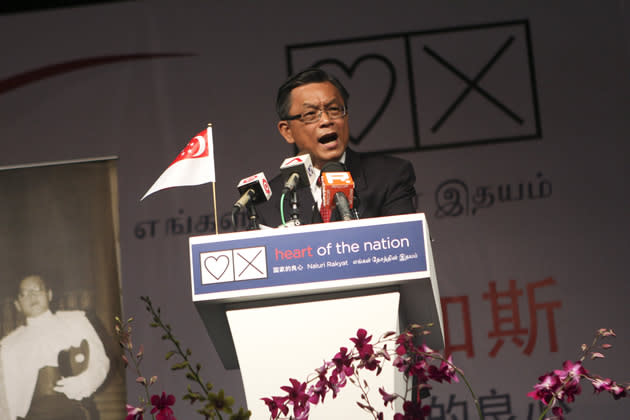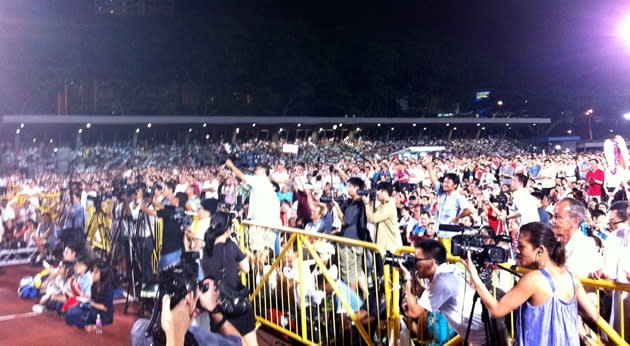Changing the direction of the presidency: Tan Jee Say
By Faris Mokhtar and Kai Fong
Presidential candidate Tan Jee Say on Tuesday voiced his intention to change the direction of the presidency to make it more people-oriented.
Speaking at his rally in the evening at Toa Payoh Stadium, the former civil service high-flier said he would like to move the role of the presidency much closer to the aspirations of the people.
"To do that, I cannot remain within the ivory gates of the Istana," said Tan who was accompanied to the rally by his wife Patricia Khoo, 50, and their four children.
"I must move among the people and initiate programmes that will galvanize the young and the young at heart. And harness their energy to build a better Singapore."
The rally, which was attended by more than 12,000 people, also saw nine guest speakers — which included opposition figures such as SDP member Vincent Wijeysingha and NSP's Nicole Seah — giving their speeches in support of him.
On whether his line-up of speakers could be seen as leaning towards the opposition, Tan said although they might be from opposition parties, they also "speak on behalf of all Singaporeans".
The 57-year-old investment advisor also revealed his plans to provide assistance to those in the lower-income bracket and the under-privileged. He added that in a fast moving society such as Singapore, "many will be left behind to live quiet, desperate lives".
He highlighted the "duty" of the president to use his moral authority to help reach the widening social divisions within the society.
"In order to that, the president must have the courage to question the government judiciously and encourage them to do better, always better,"he said.
If elected, he will exercise the powers independently without fear or favour, adding that this is the "first real contest" after the last two presidential elections ended in walkovers.
"We Singaporeans have had such a president before and we need such a president again now," he said, referring to the late president Ong Teng Cheong who had questioned the government on its reserves.
What he plans to do if elected
During the rally, Tan also raised other suggestions which he intends to fulfill if elected.
Among others, he intends to "return" bulk of the president's salary to the people, adding that he is not motivated by "personal ambition or monetary gain" and "have always been driven by public service".
He also confirmed that he will be comfortable with receiving only S$500,000 for his annual income. Presently, the president earns around S$4 million per year.
The remaining portion of his salary will be donated to his pet causes which include caring for elderly with dementia, support group for caregivers with elderly parents and youths.
Tan said he also plans to issue an annual report detailing the performance of the president during the year, adding that it will introduce greater transparency to the role.
Commenting on the reserves, he said that he will use the custodial powers to encourage the government to utilize it for the benefit of the people.
Power to exercise veto
He also touched on the power of veto which the president has over five key areas as specified under the Constitution.
These include the national reserves; key appointments within the civil service; detentions under the Internal Security Act (ISA); investigations by the CPIB; and restraining orders in connection with the maintenance of religious harmony.
Among these areas, he said the president has the power to exercise the veto if he believes the government is trying to "raid the reserves" and "spend them extravagantly on unnecessary projects".
On the use of veto against key appointments, Tan said that if elected, he will scrutinize the background and track record of all the government appointees.
"I will ensure that only true talented Singaporeans are appointed, who are motivated by a sense of public service and not by huge financial rewards," he said.
In line with his hard rhetoric, Tan said the government of today is not similar as that in the past decades. "This government needs to be challenged and checked, if we do not want it to become complacent," he added.
He also reiterated his stand against the Internal Security Act (ISA) which he said, has caused "much pain and suffering and only history will tell how many innocents were put away and condemned".
Earlier in the rally, most of the speakers also spoke in support of Tan, emphasizing on his "independence" as a candidate as compared to the others who are seen as leaning towards the establishment.
One of them, professor Paul Tambyah who is also a senior consultant on infectious diseases at a major teaching hospital said, "Most importantly Jee Say is an independent candidate.
"He has the moral courage to support the government when it does right and to question the government when it is going in the wrong direction."
Some of the speakers also touched on the need for the elected president to voice out the issues concerning average Singaporeans.
National Solidarity Party (NSP) member Nicole Seah said, "We do not need a president that remains silent on the issues affecting this nation… More importantly, we do not need a yes-man for president.
"What we need is a president who can go beyond fulfilling his ceremonial duties, to apply moral pressure on the Government where needed."



